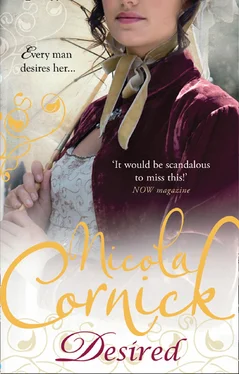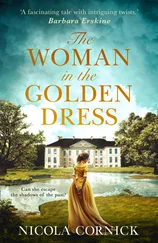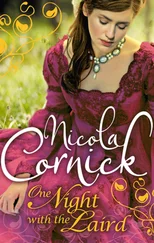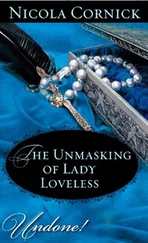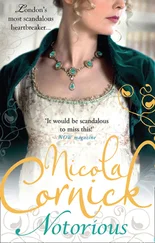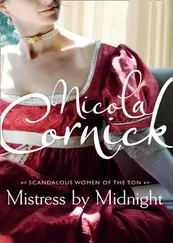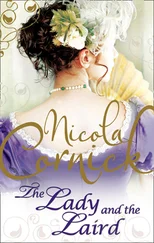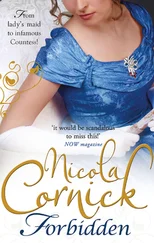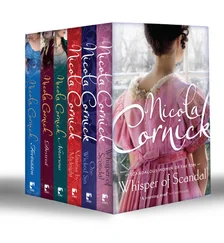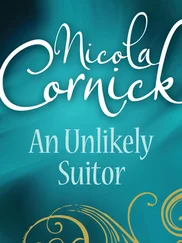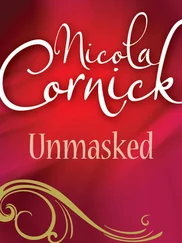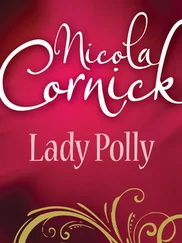1 ...7 8 9 11 12 13 ...16 “It is the most marvellous book,” Tess said, pressing on although she could feel Joanna’s fearsome disapproval. “It gives the rank, fortune and address of every bachelor and widower in the country. It is the perfect husband-hunting guide.”
“It does not record whether or not the men are impotent,” Joanna said very drily. “That, surely, is your most important criteria.”
There was a painful silence. “It gives their ages,” Tess said at last, almost managing to conceal the crack in her voice. “That should be a fair guide.”
“But not an infallible one.” Joanna’s voice had softened into pity. She put a hand on Tess’s tensely clasped ones and Tess tried not to shudder, not from Joanna’s offered comfort but from the cold pain she felt inside.
“Tess,” Joanna said. “What happened to you? What is it that you are afraid of?”
“Nothing!” Tess said. The word seemed to come out slightly too loud. The pain twisted within her like the turn of a screw.
“Then why do you only marry sickly boys and old men?” Joanna persisted. “Robert Barstow, James Darent—”
“There was only one of each,” Tess protested, “and to be fair I did not know that Robert was going to die so young.”
“With Robert you married your best friend,” Joanna said. “There was as little passion there as in your last marriage.”
Once again the silence was taut and painful. Neither of them had mentioned her marriage to Brokeby but Tess could see the question in Joanna’s eyes. Her sister had guessed that Brokeby had hurt her; she wanted Tess to confide. Tess knew Joanna’s concern was only to help her but she did not want that help. There was nothing Joanna could do to set right the past or undo the horrific experiences she had suffered at Brokeby’s hands. There was nothing that she could do except blot out those memories and make sure that such horrors never happened again.
“If you have a fear of physical intimacy,” Joanna said suddenly, “I do not understand this obsession you have with marrying.”
“You refine too much upon it,” Tess snapped, her patience breaking under the strain. “I find myself short of funds, that is all. Marriage is the easiest way to address the deficit.” She spread her hands wide in a gesture of exasperation. “For me, marriage is a business option only, preferable to a trip to the moneylenders.”
“So you are in debt?” Joanna’s exquisitely plucked brows rose disbelievingly. “I don’t believe you. You have a fortune to eclipse every other widow in society.”
“Clothes,” Tess said vaguely. “They are so monstrously expensive.”
“That is one matter on which you cannot gammon me,” Joanna said robustly. “I know all there is to know about the cost of fashion and not even you could spend all your substance on it!”
They stared at one another defiantly. Tess wondered what on earth Joanna would say if she confessed that her money was in fact mainly spent on charitable causes and radical politics. No doubt she would be more shocked than if Tess had confessed to spending it all on sex with handsome young men. There were political hostesses, of course, formidable matrons who supported the Whig or the Tory cause and gave smart dinners to promote their husbands’ careers. Reforming politics was a different matter, too extreme, dangerous and inappropriate, with its emphasis on improving the conditions of the working classes. No one in society should concern themselves with such matters. Charity was one thing; political reform quite another.
“My gambling debts are enormous,” Tess said, reaching for an excuse that never failed, “and perhaps I may catch myself a rich duke this time. I have no wish to go down the social scale rather than up.”
“Then you truly are limiting your options,” Joanna said sarcastically. To Tess’s relief she seemed to have swallowed this explanation. “Let me see,” her sister continued. “We need to find you a duke or a prince, old enough to die within a year or two so that his continued existence does not inconvenience you, sickly enough not to be interested in his marital rights and rich enough to increase your fortune! How very romantic!”
“I do not require romance from marriage,” Tess said.
“So I have observed.” Her sister sprang to her feet. “I do not believe that even The Gazetteer will be able to furnish you with the direction of such a nobleman.”
“I have whittled it down to a list of a few possibilities,” Tess said. “There is one duke, Feversham—”
“He died two weeks ago,” Joanna said.
“Oh. Well, what about the Marquis of Raymond?”
“Also very nearly dead.”
“Then there might still be time to catch him—”
Joanna glared. “Tess, no!”
“Lord Grace?”
“He is in the Fleet.” Joanna smiled sweetly. “You could have adjoining cells.”
Tess pulled a face. “Lord Pettifer?”
Joanna shook her head. “He is in Bedlam.”
Tess deflated. “Then there is no one,” she said.
“I told you so,” Joanna said, not unkindly.
After Joanna had gone, closing the door with exaggerated quiet behind her, Tess finished her cold tea and picked up The Gazetteer once again, flicking listlessly through the pages. Joanna was correct, unfortunately. The list, whilst giving the details of many eligible gentlemen, did not also come with a guarantee that they would see marriage in the same idiosyncratic light that she did. Not many men, when it came down to it, wanted a marriage of no more than convenience. Many wanted an heir, of course. Some wanted to sleep with their wives occasionally if they could not get a better offer. Many thought that a marriage should suit their convenience—that that was what the phrase meant. Tess had no intention of being available to service the needs of her husband. That would not suit her convenience. And so her choice was limited to the ancient, the infirm, the impotent or those who were attracted to their own sex rather than hers.
With a sigh, she put the book back in the drawer, retrieved one by Voltaire instead and wandered out into the hall.
Tess liked living with Joanna’s family in Bedford Square. The house was elegantly appointed and filled with the warmth and laughter of a happy family. It gave Tess a spurious sense of belonging to stay there. She had never had a home of her own, or at least not one she chose to live in. Her various marriage portions had given her a scattering of houses on estates across the country, but any of these would have been under the disapproving eye of her relatives by marriage, not a tempting option. Besides, she hated the country. It was dull and intensified her sense of loneliness. Only in London was there diversion enough to keep solitude at bay.
Tess knew that Joanna would never evict her but she had from time to time thought that she should purchase her own London house. It was embarrassing to be hanging on her family coattails at her age. The idea of living alone did not appeal, however. It made the cold chill in her heart solidify further.
In a sudden fit of irritation, Tess tweaked the bud off the stem of one of the hothouse roses displayed in a wide shallow bowl on the hall table. There. She had completely spoiled Joanna’s beautiful arrangement.
The door of the library opened abruptly. Two men came out, deep in conversation: Tess’s brother-in-law Alex and Viscount Rothbury. Tess jumped out of sheer surprise. Rothbury was, if not a frequent visitor to Bedford Square, then a regular one. He had even dined here on several occasions. It was no great surprise to see him here. Tess realised that it was simply that he had been in her mind, lurking behind her preoccupation with finding a new husband, the memory of the previous night catching at her heels.
Читать дальше
